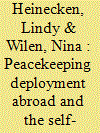| Srl | Item |
| 1 |
ID:
164777


|
|
|
|
|
| Summary/Abstract |
This study examines the issue of career advancement for Tibetan employees in private enterprises in the Tibet Autonomous Region. Semi-structured in-depth interviews were conducted with 52 enterprise employees and two government officers. Results show that, in comparison with the Han, the career advancement of Tibetan employees lags behind. Moreover, intragroup differences exist within Tibetans. A theoretical framework generated from the primary data identifies influential factors from three levels, namely the individual level, the micro-contextual (organisational) level and the macro-contextual (regional differences and Chinese governmental ethnic-related policies) level. The study aims to explore an under-researched question regarding the career experiences of ethnic minorities in contemporary China.
|
|
|
|
|
|
|
|
|
|
|
|
|
|
|
|
| 2 |
ID:
151418


|
|
|
|
|
| Summary/Abstract |
Through which mechanisms do officials in rural areas in China reach the higher cadre positions in government bureaucracies? Literature on career advancement variously points to the relevance of human capital, social capital and political loyalty, but does not provide unambiguous answers as to which type of capital plays which role in the mobility of government officials. Adopting social network analysis, the authors conducted fieldwork in a township in northeast China, and obtained overwhelming evidence of the crucial importance of the ‘strong ties’ variety of social capital (real and fictive kinship relations) for recruitment and promotion at the township level. More specifically, for the highest positions both human and social capital are required, for medium-level functions social capital alone is enough. Those who are successful and have primarily social capital acquire human capital through obtaining or buying university degrees. Likewise, tokens of political loyalty can be purchased whenever required for entering relevant administrative positions. Those who initially have only human capital will rapidly need to acquire social capital by developing fictive kinship relations if they wish to make steps in their careers.
|
|
|
|
|
|
|
|
|
|
|
|
|
|
|
|
| 3 |
ID:
151531


|
|
|
|
|
| Summary/Abstract |
During the last three decades, international peace operations have multiplied. As a consequence, trainings and deployments for peace missions have become an essential part of the military’s work. Yet the importance of peace operations to the individual soldier’s career development has so far been relatively absent in academic writing. This article attempts to fill this gap by examining how soldiers perceive the effects of their peace operation deployments in terms of career opportunities and status upon reintegration in the home unit. Adopting an inductive approach, the authors analyse 50 interviews conducted with military personnel from the South African Defence Force (SANDF). The findings show mixed responses in terms of the effect of deployments on career development. In general senior staff value the experience acquired more highly than lower ranks who experience multiple deployments as having a negative effect on vertical career mobility. Nor do lower ranked personnel see any marked change in the (in) formal status upon reintegration back into their national armed force, while higher staff officers perceive an enhanced status especially where this is related to operational success. The article argues that peacekeeping deployment should be seen as a process, which has consequences for the individual soldiers’ career long after homecoming, rather than as an independent event during a lifelong career.
|
|
|
|
|
|
|
|
|
|
|
|
|
|
|
|